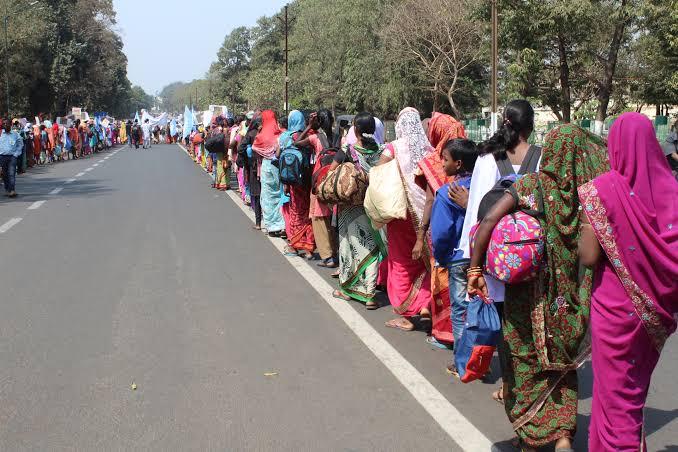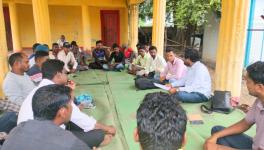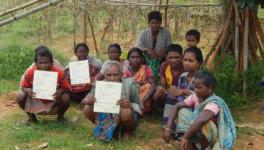Tribals in Birbhum Rally to Stop Mine-for-Forest Swap Plan

The problem with forest departments throughout the country is that they behave, ever so often, as predator when they should be playing the role of protector. The latest such case to be reported comes from Birbhum district in West Bengal, where the forest department has blithely handed over a 270-acre plot of forest to the Power Development Corporation Limited (PDCL).
On Sunday, two organisations held a rally to protest the conversion of forest land to a mining lease. The Birbhum Adivasi Gaonta (BAG) and Save Democracy Forum said that tribal people in the area – Khoirasol – depend on the forest for a living, collecting wood, honey, fruits and other forest produce. Yet, they were not consulted before the forested land was cleared for mining.
By way of specious reasoning, forest department officials said that PDCL had taken the necessary clearances to fell trees and had promised to launch an afforestation programme in Siliguri. That sounds logical. Cut down a forest in Birbhum, deprive local tribal people of their livelihoods without compensation because the forest is owned by the government in the shape and form of the forest department and then plant some trees in distant Siliguri. How munificent of the PDCL. And, of course, how so beneficial to the tribal people who depend on the Khoirasol forest.
Divisional forest officer Harikrishna has been quoted as saying, “We handed over the land to PDCL as per rules. Now it is up to the agency concerned to continue work there.” Birbhum district magistrate Moumita Godara Basu was just a little more sympathetic. “It is up to PDCL to carry on with the work. If villagers approach us, we can hold meetings to solve the issue,” she is reported to have said.
Former Supreme Court judge, Justice (retd.) Ashok Ganguly, who joined the protest rally, pointed out that it was justified. “It is illegal to set up an open-cast coalmine by deforesting the area. The government should conduct a public hearing along with the tribal people before undertaking such a project.”
Sunil Soren, convenor of BAG, made much the same point, telling the people assembled for the rally that residents of five tribal hamlets would be affected by the destruction of the forest. “The government started felling trees without discussing with tribal villagers and settling the issue of their livelihood. We will not allow the coalmine to be set up.” Therein lies the rub.
Let’s examine the proposition, made by Harikrishna, that the forest was handed over to PDCL ‘as per rules’.
The Panchayats (Extension to Scheduled Areas) Act (PESA) was passed in 1996 to give tribal people a greater stake in local governance and, specifically, in the manner in which the resources they depended on – land, forests and their resources and water – were to be utilised. This required governments in states and at the Centre to obtain the prior, informed consent of tribal people to any project that affected their resources and livelihoods.
Such consent was ideally to be obtained through public hearings at which people could express their opinions freely. Power was sought to be devolved mainly to the gram sabha, the lowest tier of the panchayati raj structure.
The spirit of the law was casually violated because the matter was a state subject and most states didn’t bother to frame rules to operationalise the Act to protect tribal people. Even where rules were framed, the provisions of the law were followed more in the breach than the practice. Quite clearly, in the Birbhum case, the spirit of the law has been ignored. The villagers, dependent on the forest for a living, have clearly not been consulted in any manner, forget a transparent public hearing.
A decade after PESA, the central government passed the Forest Rights Act. The Scheduled Tribes and Other Traditional Forest Dwellers (Recognition of Forest Rights) Act, 2006, to give this piece of legislation its full name, sought to protect the rights of forest dwellers in a number of ways, particularly from arbitrary and summary eviction. Its primary purpose was to give fixity of tenure and access to Scheduled tribes and other forest-dwelling people who either already cultivated land designated as forest or survived by collecting various kinds of produce from forested lands. In other, words it was, from the broadest perspective, designed to protect livelihoods.
Quite clearly, the spirit and letter of both these seminal pieces of legislation have been violated in Khoirasol, Birbhum. PESA is not applicable to Bengal, Harikrishna and his colleagues in the forest bureaucracy might argue, along with the district administration and the state government. The question, however, is whether the state and central governments are prepared to take on board the idea that the lives of tribal people matter, just as much as the lives of other people, and the arbitrary ‘annexation’ of a resource used by generations of a community is not conducive to equity.
Besides, the Forest Rights Act does apply through the country and under its mandate communities cannot be summarily deprived of access to a resource – in this case, by destroying a forest. And that without any hint of consultation with the people whose livelihoods are being demolished.
There is the environmental angle to be considered as well. As Ganguly pointed out, you cannot just greenlight a mining project that entails the destruction of a forest. The forest bureaucracy and the district administration have to specify whether clearance was obtained from the Union Ministry of Environment and Forests (MoEF). If the latter says it had done so, it must also clarify how it could clear a mining project in a forest area without the prior, informed consent of the tribal people who depend on the forest for their livelihoods.
The tribal people of Khoirasol will no doubt be reflecting on events that have happened not so long ago in other parts of the country. All is not lost. In 2003, the Odisha government gave mining company Vedanta, owned by Anil Agarwal, the lease to mine bauxite from the Niyamgiri Hills, principally populated by the Dongria Kondh tribal people, who revere the hill as sacred. The tribal people organised and resisted until MoEF stalled the project in 2010. In 2013, the Supreme Court ruled that the project could not go through without the consent of the tribal people, which was, obviously, not forthcoming. The Vedanta project was killed.
There are other instances of popular movements preventing patently unfair, unjust and inequitable projects from being pursued. It is to be hoped that Khoirasol joins this list.
Suhit Sen is an independent journalist. The views are personal.
Get the latest reports & analysis with people's perspective on Protests, movements & deep analytical videos, discussions of the current affairs in your Telegram app. Subscribe to NewsClick's Telegram channel & get Real-Time updates on stories, as they get published on our website.
























